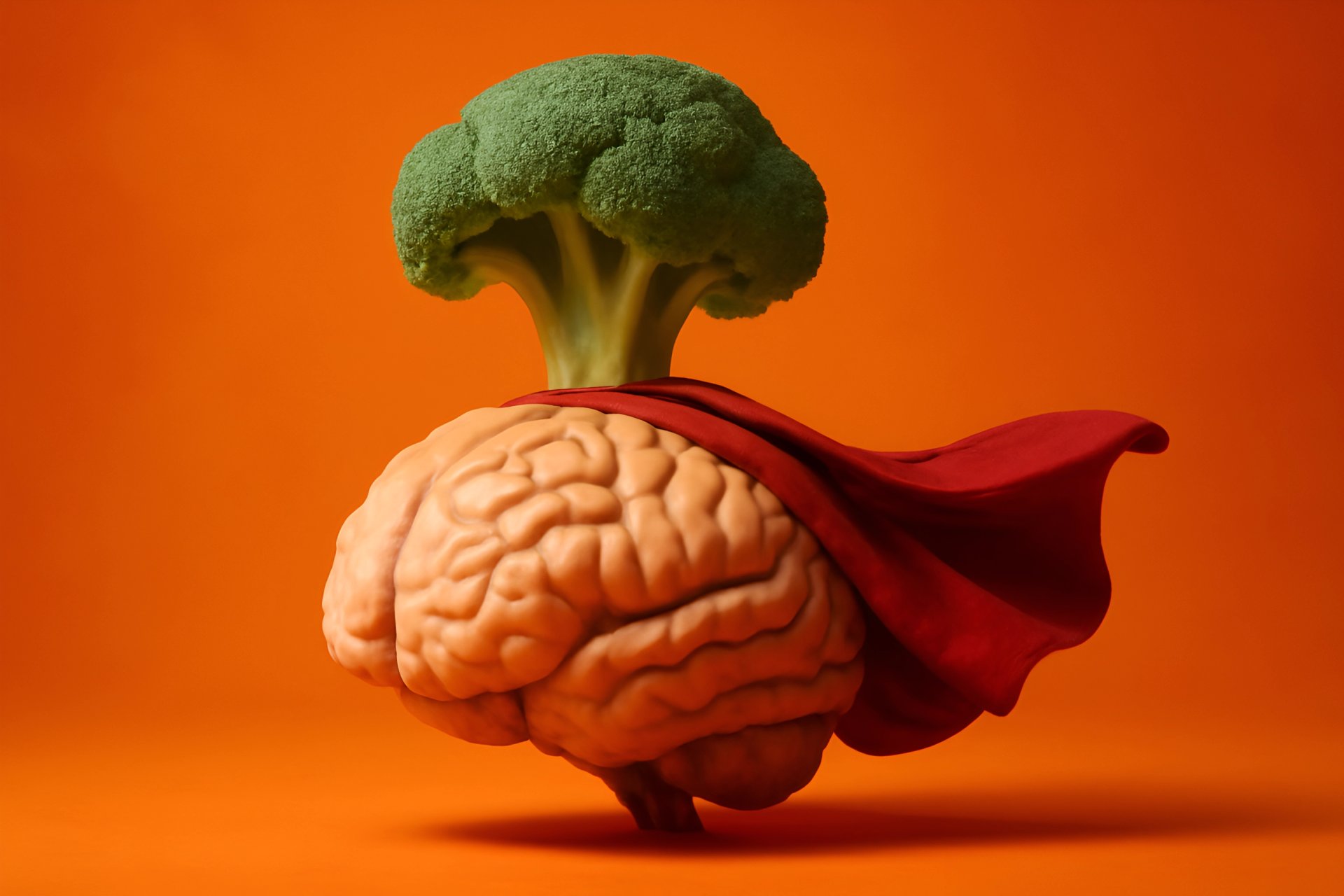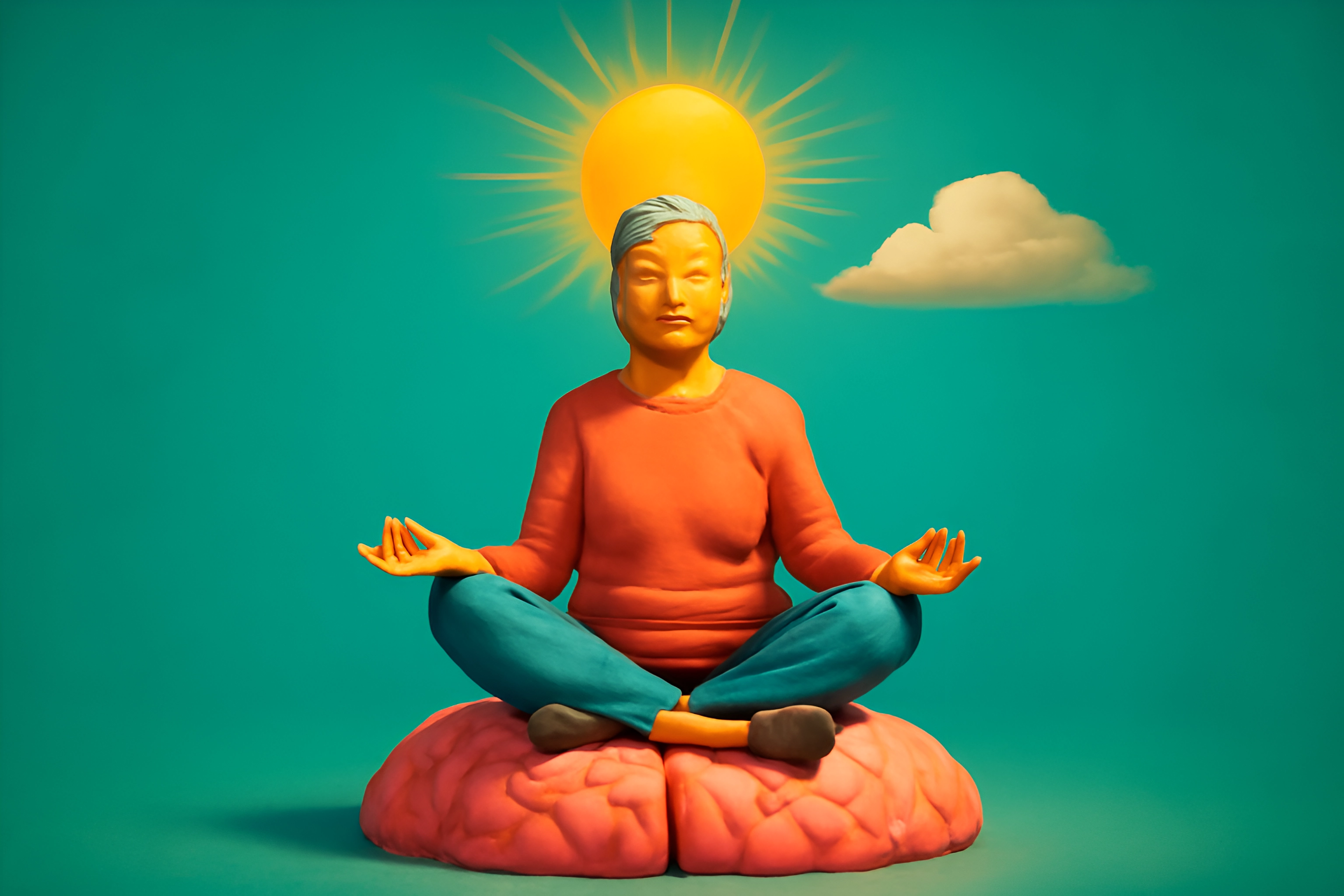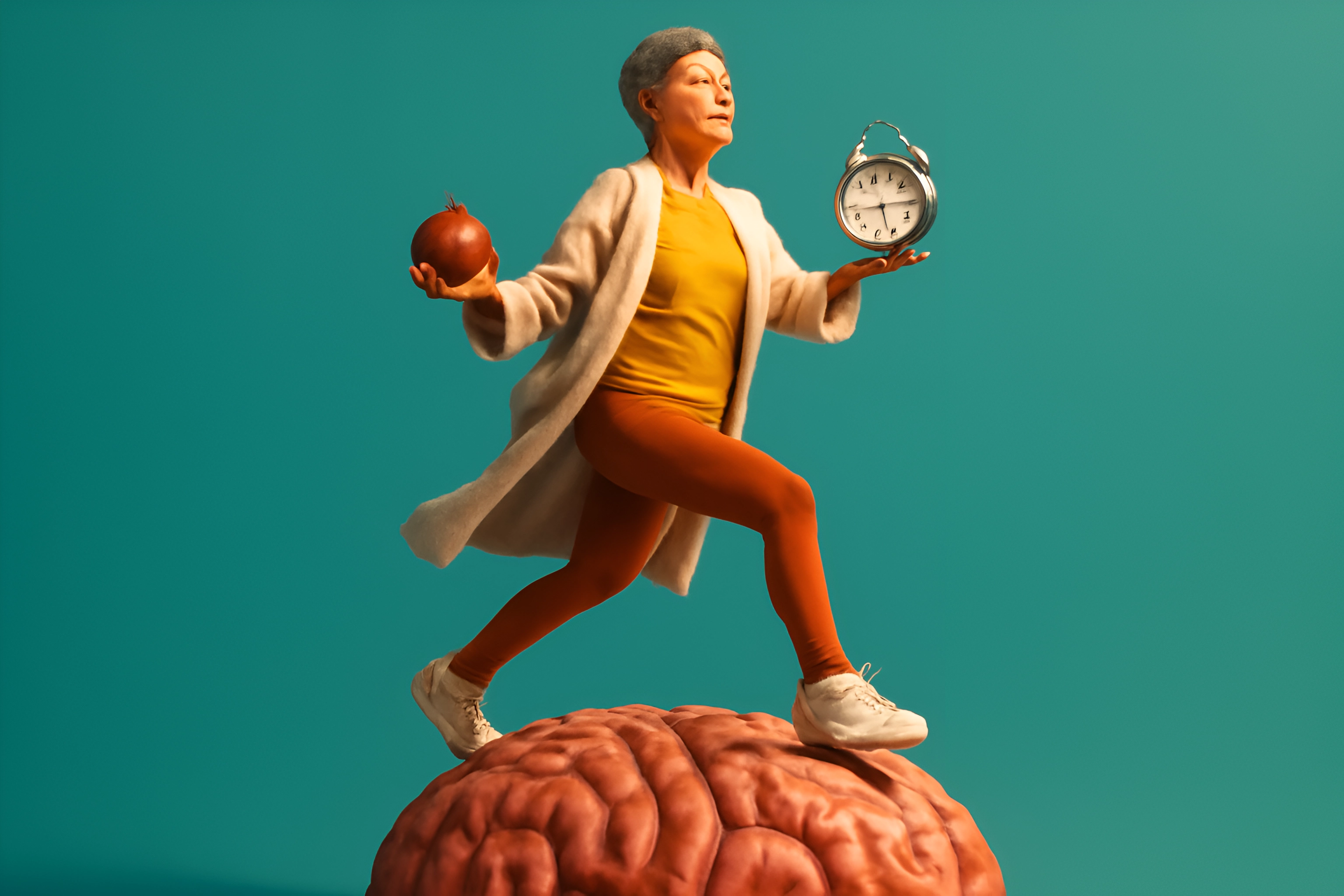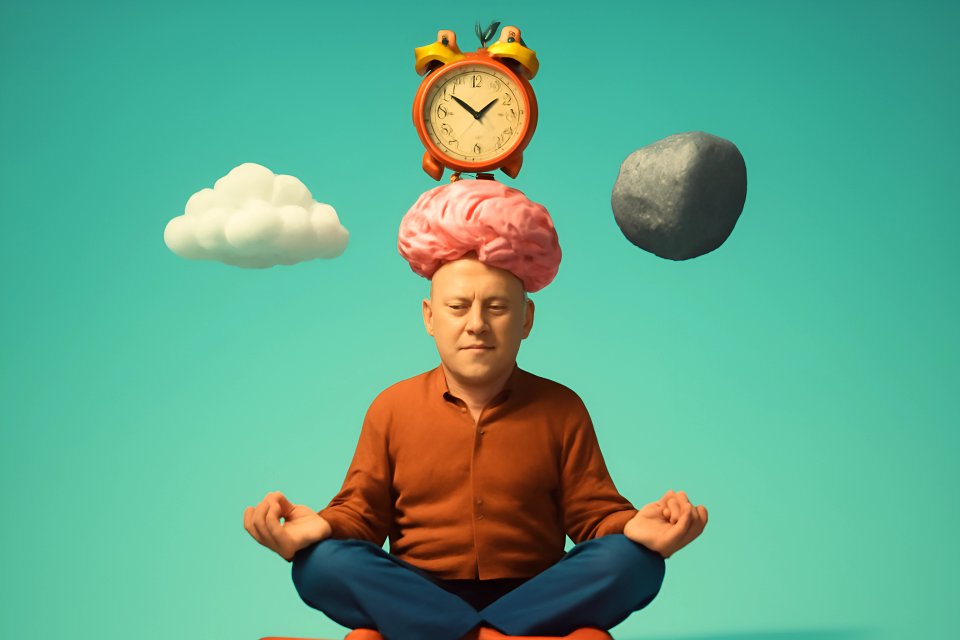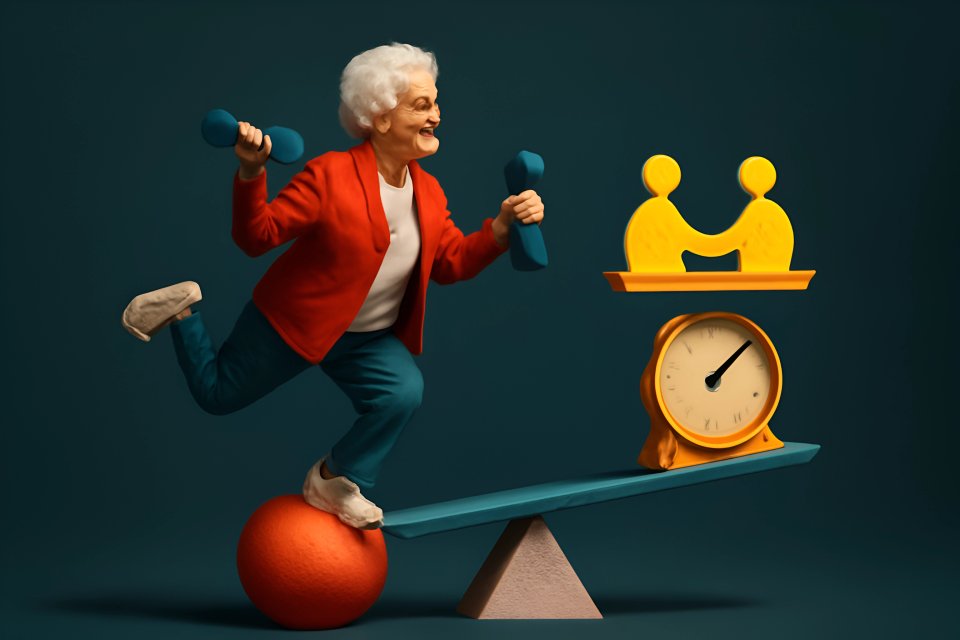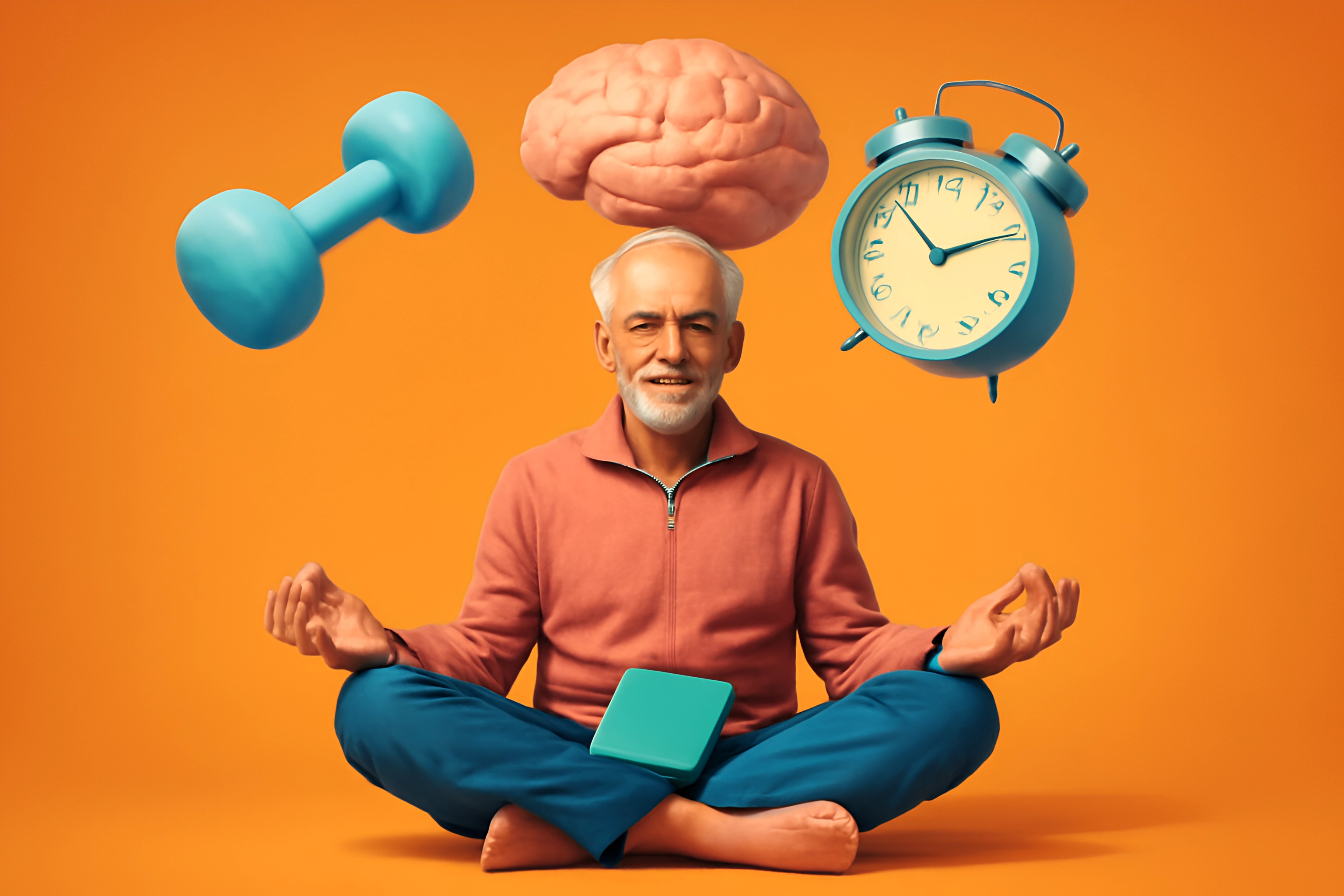
Ever walk into a room and forget why you’re there? Or feel like the "mental fog" is a little thicker than it used to be? You are not alone, and more importantly, you are not powerless against these moments.
This isn't an inevitable decline. This is a call to action. We're here to reframe "mindful aging" not as a fight against the clock, but as the active, empowering cultivation of a sharp, calm, and resilient mind. Just like our bodies, our brains thrive on consistent, gentle exercise, and the science is clear: a positive outlook on aging can make a profound difference. In fact, studies from Harvard Medical School show that individuals with a positive self-perception of aging live longer and have a 43% lower mortality risk than their peers.
This article is your practical, no-gimmicks toolkit. We will give you the exact combination of simple meditation and engaging mental exercises to build a daily routine. Get ready to enhance your mental clarity, reduce stress, and feel confident, secure, and in control of your most valuable asset.
Why Mental Fitness for Seniors is as Important as Physical Fitness
At FitOverFifty, we know that true vitality comes from a holistic approach. You can have the strongest body in the world, but if your mind feels scattered or stressed, you can’t fully enjoy the freedom and independence you’ve worked so hard for. This is why we believe that mental fitness for seniors is the critical, often-overlooked partner to physical fitness.
Nurturing your mind isn't just about staving off decline; it's about unlocking a higher quality of life. It’s about having the mental sharpness to manage your finances, the focus to learn a new hobby, and the emotional balance to navigate life’s challenges with grace. An active mind is a cornerstone of healthy aging, helping to build what experts call a "cognitive reserve"—a mental buffer that protects against age-related changes.
The benefits are not abstract; they are tangible, daily victories that empower you to live life on your own terms.
- Improved Cognitive Function: Experience better memory, sharper focus, and quicker thinking in your daily life.
- Enhanced Emotional Regulation: Feel less reactive to stress, enjoy a more balanced mood, and cultivate a greater sense of inner calm.
- Reduced Risk of Cognitive Decline: Actively engaging your brain helps build new neural pathways, which is a key strategy in preventing Alzheimer's disease and other forms of dementia.
- Increased Confidence and Independence: A sharp mind is your greatest tool for managing everything from daily tasks to pursuing new passions with vigor.
The Foundation: Simple Mindfulness Routines Over 50
Let’s get one thing straight: meditation isn’t about emptying your mind or sitting in a painful pose for an hour. That’s a myth. Mindfulness is simply the practice of paying attention to the present moment, on purpose, without judgment. It’s about giving your brain a much-needed anchor in the here and now.
The goal is comfort, accessibility, and consistency. You don’t need special equipment or a silent retreat. All you need is a willingness to give yourself a few minutes of focused peace each day, a practice that can dramatically reduce symptoms of geriatric depression and anxiety.
These foundational mindfulness routines over 50 are your starting point. They are designed to be simple, effective, and easy to integrate into your life, starting today. Think of them as the gentle warm-up for your mind.
Getting Started: The 5-Minute Mindful Breath
This is the cornerstone of all mindfulness. It’s simple, you can do it anywhere, and it takes only five minutes to reset your entire nervous system. This is your secret weapon against feeling overwhelmed.
First, find a comfortable seat. No need for a pretzel pose! A comfortable kitchen chair with your feet flat on the floor is perfect. Sit up straight but relaxed, rest your hands in your lap, and gently close your eyes or lower your gaze.
Now, simply bring your attention to your breath. Notice the sensation of the air entering your nostrils, filling your lungs, and the gentle release as you exhale. Your mind will wander—that’s what minds do! When it does, just gently and kindly guide your focus back to your breath. For a deeper dive into this practice, explore these deep breathing and meditation techniques for seniors.
The Body Scan Meditation for Stress Relief
Do you carry tension in your shoulders or jaw? The body scan is a powerful practice for releasing that stored physical stress and reconnecting with your body. It’s a systematic way to check in and let go.
Lie down comfortably on your back or sit in a chair. Close your eyes and take a few deep breaths. Start by bringing your attention all the way down to your toes. Simply notice any sensations—warmth, tingling, pressure—without trying to change anything.
Slowly, guide your awareness up through your feet, ankles, calves, and knees, spending a few moments on each body part. Continue up through your torso, arms, neck, and face, just observing and releasing. This practice is incredibly effective for calming a racing mind before bed, and our guide to mindfulness meditation techniques for stress relief offers even more ways to find your calm.
Your Toolkit: Daily Mental Exercises for a Resilient Mind
Now that you have your mindfulness foundation, it’s time to add some fun, engaging “workouts” for your brain. These exercises are designed to be enjoyable, not a chore. They complement your meditation practice by actively challenging different parts of your brain, building the strong, flexible, and resilient mind practices you need to thrive.
Think of this as cross-training for your brain. While meditation builds your capacity for focus and calm, these exercises build your mental agility, memory, and problem-solving skills. According to the National Institute on Aging, engaging in these kinds of mentally stimulating activities is a key component of maintaining cognitive health as you get older.
Let's build your mental gym. Here are three powerful exercises you can start using immediately to feel sharper and more engaged every single day.
To Sharpen Memory: The "Story of Your Day" Exercise
This simple yet profound exercise is one of the best ways to strengthen your recall pathways. It actively works the part of your brain responsible for consolidating memories. Studies show that daily narrative exercises can lead to significant improvements in memory, with some participants showing a 22% improvement in delayed recall after just six weeks.
Here’s how to do it: At the end of each day, take five minutes to mentally replay your day in chronological order. Start from the moment you woke up. What did you have for breakfast? What was the first conversation you had? Recall as many small, sensory details as you can—the taste of your coffee, the color of the sky, the feeling of the sun on your skin.
This isn't a test; it's a practice. By actively reconstructing your day, you are telling your brain that these details are important and worth saving. It’s a powerful way to fight back against the feeling that days are just blurring together.
To Boost Focus: The "Single-Tasking" Challenge
In our hyper-distracted world, the ability to focus on one thing is a superpower. Multitasking is a myth; it’s really just rapid, inefficient task-switching that leaves us feeling frazzled and unproductive. The "Single-Tasking" Challenge is your training ground for reclaiming your focus.
The instructions are simple: choose one activity and do only that one thing for 10-15 minutes. Put your phone in another room, turn off the TV, and give the task your undivided attention. You could listen to a piece of music, read a chapter of a book, or simply savor a cup of tea.
When the urge to check your email or glance at the news arises, notice it, and then gently redirect your attention back to your chosen task. This exercise builds immense cognitive control and is a fantastic way to improve brain health and lower your risk for Alzheimer's. It trains your brain to stay put, strengthening your attention span with each session.
To Enhance Problem-Solving: Learn Something New
A curious mind is a healthy mind. The act of learning something new creates and strengthens neural pathways, making your brain more flexible and resilient. You don’t have to enroll in a university course; small, consistent acts of learning are incredibly powerful.
Challenge yourself to learn one new thing every day. It could be a new word and its definition, a new recipe for dinner, or the name of a bird you saw in your yard. Watch a tutorial on a simple craft, try a Sudoku puzzle, or read an article about a topic you know nothing about.
Each time you learn something new, you are giving your brain a novel problem to solve. This process of acquiring and integrating new information is fundamental to building that "cognitive reserve" we talked about. It keeps your mind nimble, adaptable, and ready for anything.
Putting It All Together: Your Weekly Plan for Daily Meditation and Mental Exercises for Seniors
The secret to success isn't intensity; it's consistency. A few dedicated minutes each day will yield far greater results than one long session once a month. The goal is to weave these daily meditation and mental exercises for seniors into the natural rhythm of your life until they become as routine as brushing your teeth.
This sample schedule is a blueprint, not a rigid prescription. Feel free to adapt it to your own energy levels and interests. The key is to create a balanced routine that combines the calming practice of mindfulness with the active engagement of mental exercises, creating a powerful synergy for a resilient mind.
Here is a sample schedule showing how easily you can integrate these resilient mind practices into your week. We've even highlighted a key principle to remember:
Consistency over intensity is the key to building lasting neural pathways.
| Day | Morning (5-10 Mins) | Afternoon/Evening (10-15 Mins) |
|---|---|---|
| Monday | 5-Min Mindful Breath to start the week centered. | 15-Min Crossword or Sudoku puzzle to engage problem-solving skills. |
| Tuesday | 10-Min Body Scan Meditation to release any accumulated stress. | "Story of Your Day" exercise before bed to enhance memory consolidation. |
| Wednesday | 5-Min Mindful Breath. | Learn one new thing (e.g., a new word, a fact about history, or how to identify a plant in your garden). |
| Thursday | 10-Min "Single-Tasking" Challenge. Enjoy your morning coffee or tea with zero distractions. | "Story of Your Day" exercise. |
| Friday | 5-Min Mindful Breath to transition into the weekend. | Try a new, healthy recipe for dinner, engaging your senses and learning a new skill. |
| Weekend | Choose your favorite practice! Try a longer 15-minute meditation, or pair a mental exercise with a walk. This is a great time to try a low-impact exercise routine. |
Conclusion: Your Mind is Your Most Vibrant Asset—Nourish It Daily
You now hold the blueprint for a stronger, calmer, more resilient mind. We’ve shown you that those moments of mental fog are not your destiny. They are simply a signal that your brain, like the rest of your body, needs consistent and loving attention.
The powerful formula is simple: combine the quiet anchor of mindfulness with the active engagement of mental exercise. This is how you build a mind that is not just surviving, but thriving. This is how you protect your independence, sharpen your confidence, and deepen your enjoyment of every single day.
Turning 50, 60, or 70 is the start of a new, rich chapter. By investing just a few minutes each day in your mental well-being, you are ensuring that you have the clarity, focus, and resilience to write a brilliant story. You are taking control.
What's your favorite way to keep your mind sharp? Share your go-to mental exercise or mindfulness tip in the comments below to inspire the FitOverFifty community.



